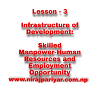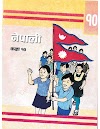Class 12 English Guide My Old Home By: Lu Xun Exercise Question Answer With Solution
5. My Old Home By: Lu Xun
Main Summary
"My Old Home" is a
short story on memory and reality. The author of this tale is Lu Xun. In this
story, the writer recalls an old house and a companion.
As the
writer returns to his former home, he has mixed emotions. He missed his country
while away from it. But when he returns to his former home, his memories are
forced to meet reality. His old understandings of the universe clash with his
reality. An important issue in this story is the contrast of recollections with
reality. This narrative depicted the narrator's childhood in a Chinese small
village.
"My Old Home" is a story about conflicting
childhood recollections and current reality. The author of this story is Lu
Xun. He is the primary narrator of this story, presenting his childhood
recollections and current reality.
It's said that he came home after twenty years and more than
600 miles. He was very happy with where he lived. He missed his old home. He
was sad when he saw how his hometown had not grown, how desolate it was, and
how many people had moved away. His old house was beautiful and used to be home
to a lot of people who were related to him. He also said that he has changed
how he thinks about his hometown since he arrived there unhappy. It was at that
time that he went back to his hometown to say "goodbye." His mother
welcomed him back when he came home. He met his nephew Hong'er. He told his
mother about a rental house that was close to where he worked. They would move
there. He wanted to sell old furniture so that he could buy new furniture for
his rental home. His mother informed him about Runtu.
The narrator wanted to meet
his boyhood friend Runtu. Along with Runtu, the narrator saw childhood
recollections. He saw Runtu with a silver necklace and a pitchfork. He watched
Runtu pushing zha with all his strength.
But zha escaped from his hit and slid between his legs. He recalled
working-class folks as full-time, daily, and part-time. In his recollections,
the narrator and Runtu were defending watermelons from zha. He recalled
everything Runtu told him. Many relatives and others visited his boyhood home.
Mrs. Yang was the talkative and amusing woman. Her
description was extremely amusing. He called her a geometry box's compass. Mrs.
Yang's conduct surprised the narrator. She rounded the storyteller. Later, the
narrator recalled her. Mrs. Yang, known as "A Beancurd Beauty" in his
boyhood, sat in her beancurd business powdering herself.
The narrator's decision to sell his former home's
furniture. After several years, the narrator met Runtu. It hurt him to say
"Master." It was known to the narrator and his mother that Runtu was
poor and had numerous children.
Responsibility, high taxes, troops, robbers, government
officials, landed gentry, social inequalities, etc. made Runtu become poor at the present condition.
Throughout his life, these conditions kept him poor. The narrator and his
mother decided to help Runtu by donating some outdated household things. Runtu
chose some ancient goods. In his choices, he even teased Runtu.
When the narrator left after nine days, he became so sad.
He recalled Runtu's superstitious idol worship. He realized the human advise for
hope. He wished his nephew Hong'er and Runtu's son Shuisheng well in the
future. He compared his current reality to his recollections. He moved on,
leaving his past behind him.
Answer the following questions.
a. How does the narrator describe his feeling at the
arrival of his old home?
➜ The narrator has many exciting and happy
feelings regarding his old home before his arrival but his exciting feelings
convert into depressing ones as he sees surroundings and environment which have
no progress as he arrives.
b. What were the three kinds of servants in China then?
What does it indicate about contemporary Chinese society?
➜ The
three kinds of servants in China were:
1.
Yearlongs: Those who work
the whole year long for one family.
2.
Short-timers: Those who work
in the daytime.
3.
Busy-monthers: Those who
plough their own land but work for a specific family just during the holidays
or rents time.
It indicates that contemporary Chinese society had a
slavery system.
c. What makes the narrator nostalgic? What did he do with
Runtu in the teenage?
➜ As the narrator’s mother asks him to meet
Runtu, he becomes nostalgic. He played with Runtu on the sandy ground among
watermelons and hitting at the Zha in the teenage.
d. How did Runtu hunt a Zha in his young age?
➜ Runtu hunted a Zha by stabbing at it with
sword in his young age.
e. How does the narrator make a humorous picture of Mrs.
Yang?
➜ The narrator makes a humorous picture of Mrs
Yang by associating her as a bean curd lady who accuses him of being miserly
for he does not want to give away his furniture to her.
f. According to the narrator, what were different factors
that made Runtu a poor man throughout his life?
➜ According to the narrator, the different
factors that made Runtu a poor man throughout his life were the heavy taxes,
social responsibilities, famines, bandits, officials, landed gentry and class
differences that he went through.
g. How does the narrator help Runtu before leaving the
old home?
➜ The narrator helps Runtu by providing him
with two long tables, an incense burner, some candlesticks, and a set of scales
before leaving the old home.
h. How does the author differentiate two kinds of idols?
➜ The author differentiates two kinds of idols
saying that a "superstitious idol" is worshipping for a while for
something immediate but "hope" as not an idol that he wants somewhere
far off in the murky distance.
i. After reading the story, what inferences can you make
about contemporary Chinese economic and social system?
➜ After reading the story "My Old
Home", we can make the following inferences about contemporary Chinese
economic and social system:
·
The story shows the
complex relationships in the peasant community in China’s society at the time.
·
It mentions about the
real physical sufferings of the peasants resulted from economic exploitation
and exposes the root causes of their miserable lives.
·
It exposes how miserable
the peasants’ mentality was after they have been long poisoned by feudal ideas.
·
For instance, Runtu is an
unforgettable and pathetic person who suffered much from hard work and
sub-marginal living.
·
It makes people clear
about the class system, slavery system and hierarchy in China presenting three
kinds of servants in China such as Yearlongs: those who work the
whole year long for one family, Short-timers: those who work
by the day time and Busy-monthers: those who plough their own
land but work for a specific family just during the holidays or rents time.
· Above all, society dictates, disallowing them to be friend. People from different classes cannot interact and develop mutual relations. They have to fulfil their roles at certain positions.


.png)



.png)
.jpeg)


.gif)



0 Comments